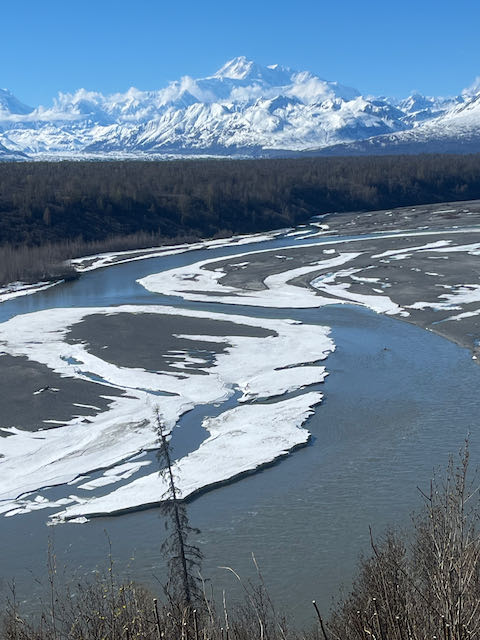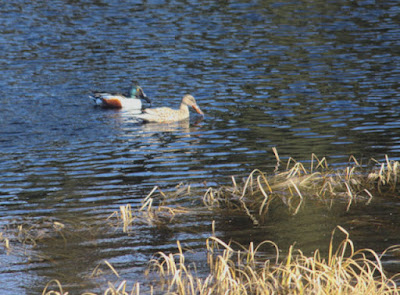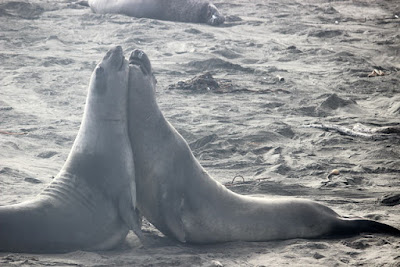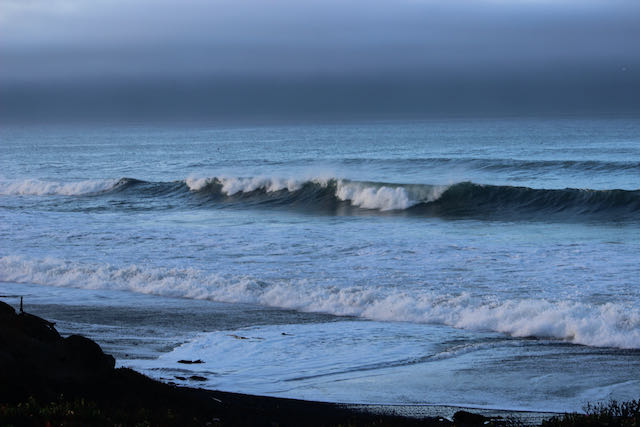I started this post a week or so ago. And I previously posted about David Scheel's book, Many Things Under a Rock. But our book club met this past week and David Scheel, an Alaska Pacific University (APU) professor, attended the meeting. I would like to spend more time on the book, but it's due at the library and I have many things on a list to do. So this is pretty quick and dirty. [He would have much preferred, he said only half jokingly, that we bought our copies rather than borrowed from the library."]
 |
| Scheel at our meeting comparing the anatomy of a stuffed octopus to a real octopuses parts |
Prior to this question he described observing an octopus leave the protection of its den, to search for food. There's the conflict between fear (and the safety of the octopuses den) and wandering out in search of food, where it's more vulnerable to predators.
Scheel writes:
"Do animals share some feelings, like hunger and fear? These feelings are imperative and evolutionarily ancient. There are perhaps no more basic feelings than the urges to eat and to avoid being eaten. Australian physiologist Derek Denton named these ancient and demanding urges the primordial emotions." (p. 191)
We learn from Scheel that Denton identified other primordial emotions:
"thirst, breathlessness (air hunger), food hunger, pain, salt hunger, muscle fatigue, sleepiness, the urge to pass urine, the urge to defecate. sexual orgasm, and the urge to regulate body temperature." (p. 192)
I guess I can accept the notion that these are 'feelings.' We 'feel' hungry, thirsty, horny, like we need to pee, or need air. But are these emotions? We don't need to quibble about words if we agree to define them, for the purpose of the discussion. But going a step further, Scheel asks whether octopuses are self-aware.
He discusses octopus activity when different predators are nearby and tells us they act differently depending on the type of predator. They are extremely cautious and tend to stay in their dens when a lurking, lunging predator lies waiting.
"Octopuses do not react in the same way to every predator. An octopus may freeze briefly or adopt a more camouflaged body pattern when a fast moving predator looms into view, but once the predator has passed normal activity returns. Swarming predators, such as he sometimes aggressive Ocean Leatherjakets, are usually ignored if near the den despite the fact that they can mob and kill an octopus that finds itself without shelter. . . Only the presence of a particular kind of predator shut down octopuses for the entire day - a sit-and-wait predator that lurked motionless nearby, awaiting a careless move." (pp. 207-208)
I'm comfortable accepting that this shows an ability to categorize, in this case, different categories of predators. But whether this is a sign of self awareness is a different issue for me. It could be an inherited ability passed on from octopuses with it, because it enabled them to survive better.
Scheel also describes an encounter with an octopus. He's following an octopus from a distance. At some point the octopus is aware that Scheel is there. He has his eye on Scheel as he hides the rest of his body by flattening it and changing its colors. Scheel tells us that being able to hide itself from a predator shows that the octopus understands what the predator can see. I realized that I had never thought about that particular skill - the ability to understand how and what another creature can see.
In another example, he tells us about having eye contact with another octopus. Scheel looked away for a second and the octopus noticed that distraction and took advantage of it to disappear.
I'm not sure why this surprised me. I have assumed without thinking, that most animals can do this. Again, is 'other awareness' a sign of consciousness? Of self-awareness?
I don't know. And Scheel, both in the book and at our book club, emphasized that our knowledge of octopus behavior is in its infancy. Observing wild octopus is challenging, and biologists aren't sure what captured octopus behavior reflects wild octopus behavior. Knowing what an octopus is thinking and even if it is thinking is a real challenge. At this point much of what we know is speculation based on limited observation and for further research to confirm or reject.
I do recommend the book. I said at the meeting that I found it very readable. The chapters were clearly written mixing octopus encounters and observations with thoughts about octopus behavior and even inclusions of other animal behavior (Scheel studied lions in Tanzania for example.) But that I found one chapter, maybe two, enough for one sitting. The end of one chapter didn't demand I read the next one. Scheel said that made sense, since many of the chapters were written as stand alone articles.
*I asked before the meeting formally began why 'octopuses' instead of 'octopi.' He said it was a long story and then we got distracted and the meeting began. I asked because in the book it was always octopuses, not octopi.




























.jpeg)







.jpeg)













